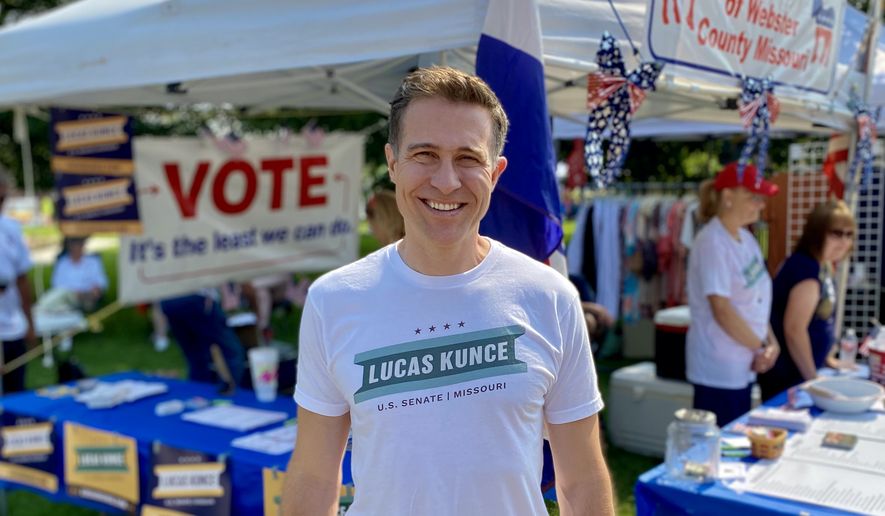Lucas Kunce is a political outsider, and he says that is going to help him win back a U.S. Senate seat in Missouri for Democrats.
The 39-year-old U.S. Marine veteran has far out-fundraised a crowded field of Democrats and most Republicans in a race for a vacant Senate seat that could be pivotal in deciding which party controls the chamber after 2022.
His neophyte status, he says, gives him an edge against opponents with political baggage.
“I have not been corrupted by a system that is very corrupting. I have never taken a dime of money from any of these people who are stripping our communities for parts. I owe no one anything, except the people that I grew up with,” Mr. Kunce said in an interview with The Washington Times.
But the race includes a mix of political newcomers and experienced politicians vying for the seat of retiring GOP Rep. Roy Blunt. There are seven declared Democratic candidates and eight Republican candidates.
At this early stage, Mr. Kunce is winning the money race.
Between July and September, Mr. Kunce reported raising almost $840,000, followed by former state Sen. Scott Sifton with $220,000.
Spencer Toder, an entrepreneur, reported raising around $12,000. Three other Democratic candidates raised under $5,000 or did not report their totals.
Mr. Kunce also outraised the field of Republicans in that period, including Missouri Attorney General Eric Schmitt, U.S. Reps. Vicky Hartzler and Billy Long, and former Gov. Eric Greitens.
Jeremy Walling, a political science professor at Southeast Missouri State University, said Mr. Kunce has been able to take the lead in the money race using a fundraising strategy similar to former President Barack Obama: asking for small-dollar donations.
“This is somebody who is being seen as viable. He’s built a campaign organization that knows what they’re doing,” Mr. Walling said of Mr. Kunce.
Mr. Kunce credited his fundraising ability to hone a message that can reach people across party lines.
“We have a real message that speaks to you whether you’re a Democrat or Republican,” Mr. Kunce said. “This is not a left-right campaign. This is a top-bottom campaign about changing who has power.”
Still, Mr. Kunce’s odds in the race remain long. The state that’s been trending Republican in recent years.
In 2018, conservative firebrand Sen. Josh Hawley ousted longtime Democratic Sen. Claire McCaskill by about a 6-point margin.
Ms. McCaskill, who was first elected to the Senate in 2006, was the last Democrat to win a statewide election in Missouri.
Mr. Blunt won his 2016 race by about 3 points against then-Missouri Secretary of State Jason Kander.
Charlie Dalton, the executive director of the Missouri Republican Party, was confident his party would continue the trend.
“Missouri is already a red state. Gov. Parson won by over 16 points last cycle,” Mr. Dalton said. “We expect similar success this coming November, but that being said, we’re not going to take anything for granted. We’re going to put in the same amount of work as we did last cycle to make sure we win by double digits again.”
But, Mr. Kunce, described by some as a populist of the left, said he is crafting a message that could appeal to Missouri’s conservative voters.
He pledged to break up Big Tech, abolish corporate PACs, and implement a Marshall Plan for the Midwest to reinvigorate communities that have lost jobs to foreign competitors.
He currently serves as the director of national security policy at the American Economic Liberties Project, an anti-monopoly organization.
Mr. Kunce has also railed against outsourcing jobs overseas, and stressed the need to mitigate China’s rise and competition against the United States, in the vein of an “America First” message point.
“We need to bring semiconductor manufacturing back here. We can do it right here in Missouri,” he said. “I’m telling you the cost of doing that is so much less than the $6.4 trillion we spent in Iraq and Afghanistan. It will have so much more national security impact, and it’s infinitely less than a war with China’s going to cost us.”
Mr. Kunce’s challenge will be trying to make gains in rural parts of the state that have increasingly rejected Democrats, while also appealing to urban voters for a strong turnout, said University of Missouri political science professor Peverill Squire.
Mr. Squire said it is a challenge, but Mr. Kunce has a unique presence among Democrats in the race that could give him an advantage.
“He probably offers one of the better chances the Democrats have in terms of being able to compete statewide,” the professor said. “Given his background and his ties to the state, he may be able to pull it off.”
• Mica Soellner can be reached at msoellner@washingtontimes.com.




Please read our comment policy before commenting.